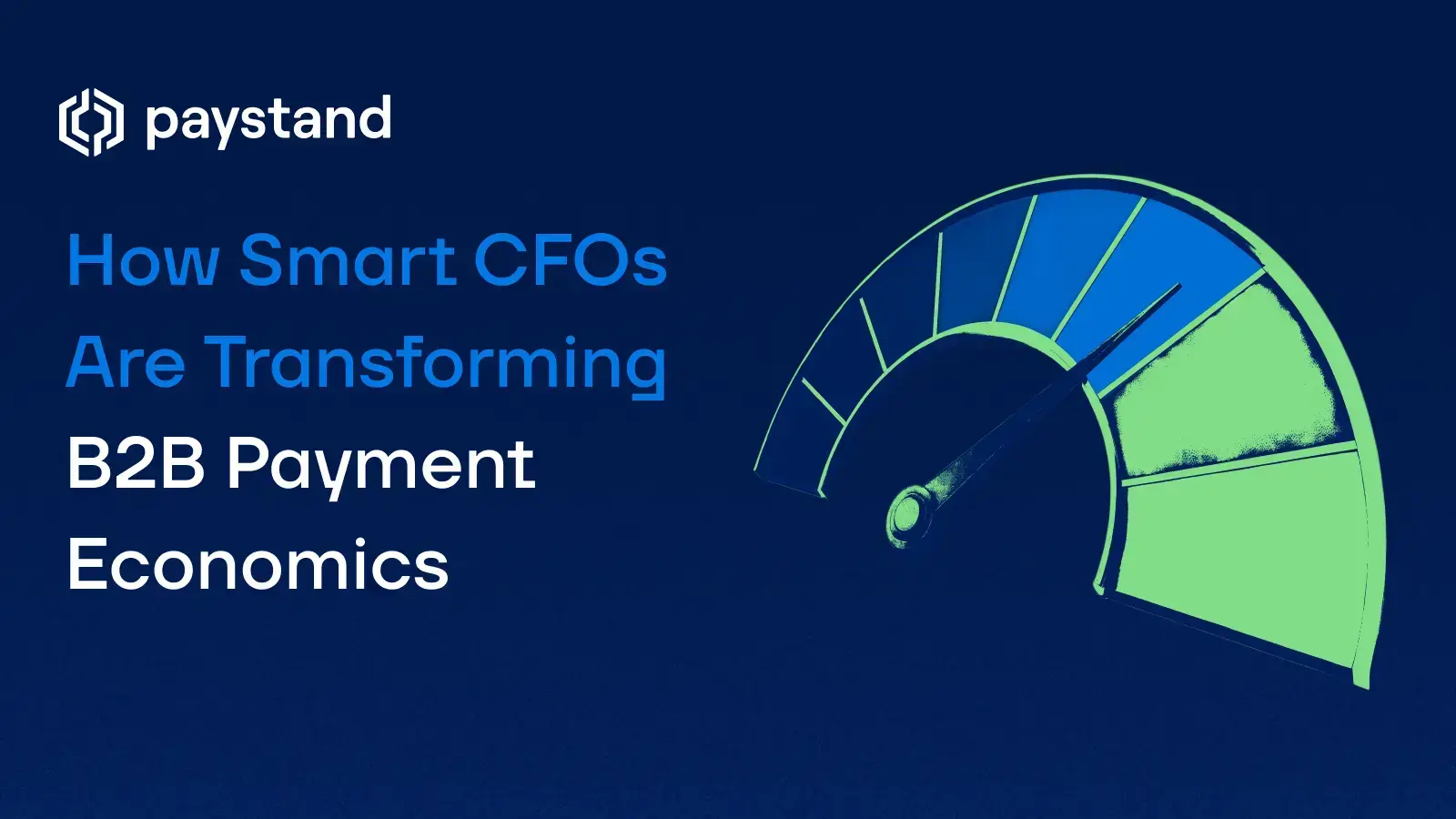How Smart CFOs Are Transforming B2B Payment Economics

Table of Contents
- What are B2B Payments?
- Critical B2B Payment Trends in 2025
- The Case for Modernizing B2B Payment Infrastructure
- Better B2B Payments with Paystand
Key Takeaways
- B2B payment transaction fees of 1-5% across B2B payment methods create significant profit margin erosion that compounds over time.
- Hidden costs include manual reconciliation time, delayed book closings, tied-up working capital, and administrative overhead from handling exceptions and errors.
- Payment modernization creates competitive advantages through better supplier relationships, early payment discounts, improved cash flow visibility, and strategic positioning in vendor selection.
- Modern payment platforms eliminate transaction fees while providing automated reconciliation, enterprise security, seamless ERP integration, and scalable infrastructure.
You're reviewing quarterly financials where revenue growth exceeded projections, yet profit margins feel thinner than expected. A closer examination reveals the culprit: payment processing fees ranging from 1-5% are systematically eroding profitability across every transaction.
For CFOs navigating competitive markets, these "small" percentages compound into significant profit leakage over time. Successful finance leaders recognize this pattern and are transforming payment processing from a hidden cost center into a competitive advantage.
Through deliberate payment infrastructure modernization, they're creating operational efficiencies, improving supplier relationships, and building financial agility that directly impacts bottom-line performance and market positioning.
What are B2B Payments?
B2B payments are financial transactions between businesses for goods, services, or partnerships. Unlike instant consumer payments via cards or wallets, B2B transactions are complex and involve larger amounts, longer payment cycles, and multiple layers of approval.
For decades, checks and bank transfers were the standard, with paper invoices and manual reconciliation causing bottlenecks. Today, businesses are shifting toward digital payments, real-time processing, and automation to eliminate inefficiencies.

Businesses must consider multiple factors when selecting a B2B payment system. Cost is a given, but what about security, compliance, and integration with existing software? The right solution should process payments, streamline operations, enhance cash flow visibility, and reduce risk.
Examples of Types of B2B Payments
- Wire transfers: Most expensive option at 2-5% per transaction plus additional processing fees, typically used for high-value or international payments
- Credit cards: Range from 2-4% transaction fees with additional merchant processing costs, offering convenience but eroding profit margins
- ACH transfers: Mid-range cost at $0.20-3.00 per transaction, providing reliable electronic processing with 1-3 day settlement times
- Paper checks: Hidden costs exceed $5 per payment when factoring in printing, mailing, processing time, and manual reconciliation requirements
- Digital payment platforms: Most cost-effective option, often reducing fees to under 1% or eliminating transaction costs entirely
- Bank-to-bank transfers: Direct transfers that minimize intermediary fees while providing secure, traceable payment processing
Your payment mix directly impacts overall transaction cost ratios that appear on P&L statements as operational expenses, making payment method selection a critical financial decision for margin optimization.
How Do B2B Payments Differ from Consumer Payments?
B2B payments involve significantly higher transaction values, complex approval workflows, and extended payment terms that create working capital implications.
Unlike consumer payments that prioritize speed and convenience, B2B transactions require detailed documentation, multi-level authorization, and integration with accounting systems for proper expense categorization and audit trails.
Business payments also involve relationship dynamics where payment timing affects supplier negotiations, early payment discounts, and vendor prioritization during supply shortages.
These transactions carry greater regulatory compliance requirements, tax implications, and the need for detailed reporting that supports financial planning and cash flow forecasting across quarterly and annual business cycles.
Critical B2B Payment Trends in 2025
The B2B payments space is witnessing businesses abandon legacy systems that drain profitability and operational efficiency. Finance leaders are adopting new payment technologies to gain competitive advantages through superior cash flow management, supplier relationships, and operational agility.
Understanding these trends enables CFOs to make strategic infrastructure decisions that position their organizations ahead of market shifts.
1. Digital and Real-Time Payments Become Standard
Businesses are rapidly transitioning from paper checks and manual processes to digital payment methods that provide immediate confirmation and settlement.
Real-time payments eliminate the working capital delays inherent in traditional payment rails, offering instant access to funds and dramatically improving cash flow visibility and operational agility. This shift reduces administrative overhead while enabling more precise financial planning and supplier relationship management.
2. Embedded Finance and Seamless Payment Integration on the Rise
Embedded finance is helping businesses initiate and manage payments directly within their core platforms—ERPs, accounting software, and supply chain systems—eliminating manual reconciliation and reducing processing errors.
White-labeled payment APIs and native app integrations create seamless workflows that reduce the finance team's workload while improving accuracy. This integration approach transforms payment processing from a standalone function into an automated component of broader business operations.
3. AI and Automation Increasing Security and Payment Efficiency
AI-driven tools are automating invoice-to-pay workflows, fraud detection, and exception handling to improve security while reducing manual errors. These technologies enable faster, more accurate processing of high transaction volumes while providing intelligent routing that optimizes costs across different payment methods.
Automated systems also generate detailed analytics that support strategic decision-making and regulatory compliance reporting.
4. Cross-Border and Blockchain-Based Payments Are Rising
Global trade is driving increased demand for efficient cross-border payment solutions that reduce currency conversion costs and settlement delays.
Businesses are adopting multi-currency platforms that provide transparent exchange rates and faster international transfers. Blockchain and stablecoin technologies offer enhanced speed, transparency, and auditability for international transactions.
These solutions eliminate traditional correspondent banking fees and provide real-time tracking across complex international payment networks.
5. Buy Now, Pay Later (BNPL) Payments Gain Traction in B2B
BNPL models are expanding rapidly in B2B sectors, offering flexible financing options that help businesses optimize working capital management beyond traditional Net 30 or Net 60 payment terms.
Unlike standard payment terms that delay payment obligations, B2B BNPL provides structured financing with personalized payment schedules that align with cash flow cycles.
This approach enables suppliers to receive immediate payment while buyers access extended payment flexibility without impacting credit lines or supplier relationships.
The Case for Modernizing B2B Payment Infrastructure
Most CFOs focus on the visible transaction fees when evaluating payment costs, but these represent only a fraction of the total financial impact. The true cost of legacy payment systems extends far beyond processing fees to include operational inefficiencies, competitive disadvantages, and regulatory risks that compound over time.
Forward-thinking finance leaders are quantifying these hidden costs to build compelling business cases for payment infrastructure modernization that delivers measurable ROI across multiple dimensions.
Quantifying the True Cost of Payment Processing
Transaction fees are just the visible portion of payment processing costs that CFOs can easily calculate from their operations. Hidden expenses include staff time spent on manual reconciliation, delays in closing monthly books that impact reporting timelines, and working capital tied up waiting for payments to clear.
Administrative overhead from handling payment exceptions, failed transactions, and error corrections creates additional costs that often exceed the original transaction fees when properly measured.
Competitive Advantage Through Payment Efficiency
Faster payment processing strengthens supplier relationships and creates negotiating power for early payment discounts that directly improve profit margins. Streamlined payment capabilities differentiate companies in vendor selection processes, while real-time cash flow visibility enables more strategic financial planning and investment decisions.
Payment modernization also supports broader digital transformation initiatives by creating automated workflows that reduce operational friction and improve customer experience.
Risk Mitigation and Regulatory Compliance
Legacy payment systems create fraud and security vulnerabilities that expose organizations to financial losses and regulatory penalties. Modern payment infrastructure enhances audit trails and compliance reporting capabilities.
The result is simplified regulatory requirements implementation and less administrative burden.
Proactive payment modernization addresses changing regulatory trends that enforce more payment transparency. This approach also improves insurance coverage and liability protection considerations through enterprise-grade security features.

Better B2B Payments with Paystand
For CFOs ready to transform payment processing from a profit-draining cost center into a competitive advantage, Paystand eliminates B2B payment fees and streamlines finance operations for additional cost savings.
- Zero-fee digital payments through a proprietary blockchain network that eliminates transaction costs entirely
- Automated invoice processing and reconciliation that reduces the finance team's workload and manual errors
- Enterprise-level security and compliance features that mitigate risk while meeting audit requirements
- Seamless ERP integration that provides real-time visibility into cash flow and payment status
- Scalable platform that grows with business operations across teams, regions, and subsidiaries
Explore how Paystand can transform your B2B payment economics and eliminate transaction fees from your operations.








